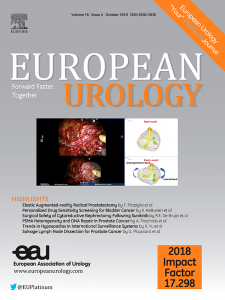晚期前列腺癌患者的管理。2024 年晚期前列腺癌共识会议(APCCC)报告
IF 25.3
1区 医学
Q1 UROLOGY & NEPHROLOGY
引用次数: 0
摘要
背景和目的创新改善了晚期前列腺癌(PC)的治疗效果。然而,在对日常实践有重大影响的各种主题上,我们仍然缺乏高水平的证据。2024 年晚期前列腺癌共识会议(APCCC)就临床管理中的关键问题对专家进行了调查,以补充循证指南。方法在会议召开前,由 120 位国际 PC 专家组成的小组采用改良的德尔菲流程,就 8 个不同的主题制定了 183 个多选共识问题。主要发现和局限性共识的先验定义是≥75%的一致意见,强烈共识的定义是≥90%的一致意见。投票结果显示了不同程度的共识,本文对此进行了讨论,并在补充材料中进行了详细说明。这些结果不包括正式的文献综述或荟萃分析。结论和临床意义投票结果可以帮助医生和患者了解临床管理中存在争议的领域,因为这些领域的高级别证据很少或存在冲突。投票结果还有助于资助者和政策制定者确定未来研究的优先领域。诊断和治疗决策应始终根据患者和癌症特征进行个体化,并应结合当前和新出现的临床证据、指南以及后勤和经济因素。我们始终大力鼓励参加临床试验。重要的是,亚太癌症研究中心 2024 年会议再次确定了值得在专门设计的试验中进行评估的重要差距(未达成共识的领域)。本文章由计算机程序翻译,如有差异,请以英文原文为准。
Management of Patients with Advanced Prostate Cancer. Report from the 2024 Advanced Prostate Cancer Consensus Conference (APCCC)
Background and objective
Innovations have improved outcomes in advanced prostate cancer (PC). Nonetheless, we continue to lack high-level evidence on a variety of topics that greatly impact daily practice. The 2024 Advanced Prostate Cancer Consensus Conference (APCCC) surveyed experts on key questions in clinical management in order to supplement evidence-based guidelines. Here we present voting results for questions from APCCC 2024.
Methods
Before the conference, a panel of 120 international PC experts used a modified Delphi process to develop 183 multiple-choice consensus questions on eight different topics. Before the conference, these questions were administered via a web-based survey to the voting panel members (“panellists”).
Key findings and limitations
Consensus was a priori defined as ≥75% agreement, with strong consensus defined as ≥90% agreement. The voting results show varying degrees of consensus, as discussed in this article and detailed in the Supplementary material. These findings do not include a formal literature review or meta-analysis.
Conclusions and clinical implications
The voting results can help physicians and patients navigate controversial areas of clinical management for which high-level evidence is scant or conflicting. The findings can also help funders and policymakers in prioritising areas for future research. Diagnostic and treatment decisions should always be individualised on the basis of patient and cancer characteristics, and should incorporate current and emerging clinical evidence, guidelines, and logistic and economic factors. Enrolment in clinical trials is always strongly encouraged. Importantly, APCCC 2024 once again identified important gaps (areas of nonconsensus) that merit evaluation in specifically designed trials.
求助全文
通过发布文献求助,成功后即可免费获取论文全文。
去求助
来源期刊

European urology
医学-泌尿学与肾脏学
CiteScore
43.00
自引率
2.60%
发文量
1753
审稿时长
23 days
期刊介绍:
European Urology is a peer-reviewed journal that publishes original articles and reviews on a broad spectrum of urological issues. Covering topics such as oncology, impotence, infertility, pediatrics, lithiasis and endourology, the journal also highlights recent advances in techniques, instrumentation, surgery, and pediatric urology. This comprehensive approach provides readers with an in-depth guide to international developments in urology.
 求助内容:
求助内容: 应助结果提醒方式:
应助结果提醒方式:


